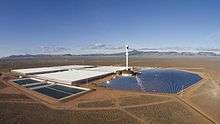Sundrop Farms
Sundrop Farms is a developer, owner and operator of high tech greenhouse facilities which use a number of technology solutions to grow crops with less reliance on finite natural resources than conventional greenhouse production.[1] Sundrop Farms opened its first pilot facility in Port Augusta, South Australia, in 2010 (operating as Seawater Greenhouse Australia Pty Ltd). This facility was originally designed as a Seawater Greenhouse, however significant technology changes led to the Sundrop System, and the dissolution of the joint venture with Seawater Greenhouse Ltd.[2] Sundrop Farms has offices in London, UK and Adelaide, Australia.
Sundrop System
The primary inputs to a greenhouse are heat, electricity, water, and nutrients. The Sundrop System is a collection of technologies which, when used in combination, reduce the need for finite resources in these inputs versus conventional greenhouse production. In Sundrop Farms’ first facilities in South Australia, these technologies include concentrated solar power, thermal desalination, and steam-driven electricity generation.[3] This is the first combined heat, power, and water system powered by solar energy for greenhouse production.
Commercial Expansion in Australia

As of 2015, Sundrop Farms is constructing a 20 hectare solar-powered greenhouse facility near its original site, south of Port Augusta in South Australia.[4] This facility, scheduled for completion in 2016, is expected to produce 15,000 tons of truss tomatoes each year to supply the Australian supermarket operator Coles under a ten year contract.[5] Sundrop Farms operations will be primarily powered by a new concentrated solar thermal power plant and seawater will be withdrawn from Spencer Gulf and desalinated to feed produce. The project was expected to generate around 100 jobs during the construction of the greenhouse facility (underway as at October 2015) and approximately 200 jobs once operational. In 2014, private equity firm Kohlberg Kravis invested $100 million in the company. The development has been supported by the Government of South Australia which has provided approximately $6 million in grant funding. A $150 million development contract was awarded to John Holland in 2014 to construct the expanded facility over an 18-24 month time-frame[6][7] and the total project cost is an estimated $205 million.[8]
Concentrated Solar Power
Coordinates: 32°32′51.4″S 137°50′48.1″E / 32.547611°S 137.846694°E Sundrop Farms' 20 ha expanded facility will utilise eSolar’s Solar Collector System and a Solar Receiver System from Aalborg CSP A/S.[9] Commissioned in October 2016,[10][11][12][13] the facility's concentrated solar thermal plant has a generating capacity of 1.5 MW.[14]
Desalination plant
Sundrop Farms' original pilot facility desalinated seawater but did not return waste brine to Spencer Gulf. The brine was collected in ponds from which salt could be harvested.[15] The company's brine management plan changed with their proposed 20 hectare expansion in 2014. Sundrop Farms sought and received approval from the South Australian Environment Protection Authority to discharge waste brine into Spencer Gulf at a salinity of 60 parts per thousand. Once constructed, the expanded facility will discharge its brine into the cooling water outflow channel at the existing coal-fired Port Augusta power stations.[14] Environmental approval from the Commonwealth Government via referral under the EPBC Act[16] was not required of or sought by Sundrop Farms for this project. Sundrop Farms continues to investigate commercially viable solutions for the recovery of minerals from brine at a large scale.[3]
Government support
In addition to receiving government financial support, the firm has been endorsed by South Australian Premier Jay Weatherill and several South Australian ministers, including Geoff Brock[17] and Gail Gago.[18] Sundrop Farms' former chairman David Travers was employed in the South Australian public sector as the Deputy Agent General for South Australia in London when he received the firm's initial proposal.[15][19]
References
- ↑ "The Q&A: John Phinney of Sundrop Farms". www.nortonrosefulbright.com. Retrieved 2016-01-05.
- ↑ Margolis, Jonathan. "Growing food in the desert: is this the solution to the world's food crisis?". the Guardian. Retrieved 2016-01-05.
- 1 2 "Sundrop System - Sundrop Farms". Sundrop Farms. Retrieved 2016-01-05.
- ↑ Fairfax Regional Media (24 March 2016). "Solar tower reaches new heights". The Transcontinental. Retrieved 24 March 2016.
- ↑ "Kohlberg Kravis Diversifies: Invests $100M in Sundrop Farms - Analyst Blog". NASDAQ.com. Retrieved 2015-10-14.
- ↑ "MINUTES OF PORT AUGUSTA CITY COUNCIL MEETING HELD ON MONDAY 15 DECEMBER 2014" (PDF). Port Augusta City Council. 2014-12-15. Retrieved 2015-10-19.
- ↑ Brown-Paul, Christine (2015-01-01). "Fossil Free Future" (PDF). Practical Hydroponics & Greenhouses (151). Retrieved 2015-10-19.
- ↑ "In Focus - South Australian Major Developments 2014/15 (p44)" (PDF). Government of South Australia. Retrieved 2015-10-23. line feed character in
|title=at position 28 (help) - ↑ "Sundrop Farms Port Augusta Expansion". eSolar. Retrieved 2015-10-14.
- ↑ https://www.technologyreview.com/s/602574/a-desert-full-of-tomatoes-thanks-to-solar-power-and-seawater/
- ↑ https://www.fwi.co.uk/business/120m-pound-state-of-the-art-tomato-farm-opens-in-australia.htm
- ↑ "First farm to grow veg in a desert using only sun and seawater". New Scientist. Retrieved 8 October 2016.
- ↑ "FOTOS: Danske solanlæg laver 17.000 tons australske tomater". Ingeniøren. Retrieved 7 October 2016.
- 1 2 "COUNCIL DEVELOPMENT ASSESSMENT PANEL AGENDA Meeting #123" (PDF). Port Augusta City Council. Port Augusta City Council. 2014-08-12. Retrieved 2015-10-14.
- 1 2 "Bright Idea". 2012-04-15. Retrieved 2015-10-14.
- ↑ "Referrals list · Basic Portal". epbcnotices.environment.gov.au. Retrieved 2015-10-14.
- ↑ "Sundrop Farms greenhouse expansion expected to create 300 jobs in Port Augusta". Yahoo News. Retrieved 2015-10-14.
- ↑ "Funding for skills to lead to Sundrop Farms jobs". www.my5cs.com. Retrieved 2015-10-14.
- ↑ UniSA. "The University of South Australia: Home". www.unisa.edu.au. Retrieved 2015-10-14.